White House Warns Against Iraq Visits : Diplomacy: U.S. lawmakers could be taken hostage or used for propaganda purposes, Fitzwater says.
- Share via
WASHINGTON — The White House urged members of Congress to reconsider any plans to visit Iraq to seek the release of hostages, warning that foreign intermediaries are being used as pawns in a cruel propaganda game.
However, President Bush’s spokesman said, “If a congressman or senator feels they have a responsibility and a right to go, we certainly aren’t going to stop them.”
California Rep. Mervyn M. Dymally (D-Compton) and Sen. Harry Reid (D-Nev.) have said, after meeting with Iraqi Ambassador Mohammed Mashat, that they have been promised visas for such a trip, and Dymally has indicated he is inclined to make the journey.
“We discourage everyone’s travel to Iraq because we think it’s dangerous to go. We think there’s a chance that they can become hostages themselves, they can be subject to physical harm or they can be used for political value,” White House Press Secretary Marlin Fitzwater said.
A Bush Administration official, speaking on condition of anonymity, said several members of Congress have been invited to Baghdad by the Iraqi Embassy here. He said the State Department is taking a relatively low-key approach in response, telling Congress that the Administration opposes such trips but will leave the final decision to individual members.
At the heart of the Administration’s objection is a concern that these appeals give Iraqi President Saddam Hussein hope that the U.S.-led coalition against him is weakening and provide him propaganda opportunities.
This week alone, former Japanese Prime Minister Yasuhiro Nakasone and former West German Chancellor Willy Brandt have visited Baghdad to negotiate the release of Japanese and German hostages. Similar trips were made by former British Prime Minister Edward Heath, who secured the release of about 40 hostages, and civil rights activist Jesse Jackson, among others.
On Wednesday, 74 Japanese citizens flew to freedom from Iraq as a result of Nakasone’s visit. On Wednesday, the official Iraqi News Agency said 100 Germans will be freed as a result of a meeting between Brandt and Hussein. Another 20 hostages also are to be released, including a few Americans. Last week four Americans who had been ill were given their freedom.
Such moves, along with Hussein’s invitation to the families of hostages to visit their relatives during the holidays, “deserve a rather harsh comment in the sense that they’re obvious, very cynical attempts at propagandizing this situation,” Fitzwater said.
“He is cruelly toying with the emotions of families who obviously want to see their relatives when the fact is, if he wants them to get together, he ought to let those hostages come home.
“The officials and others who are going there walk a very fine line between trying to help their countrymen and being used by Saddam Hussein,” the White House spokesman said. “This is a matter of great concern to us. One cannot help but be outraged at the cynicism that it displays.”
Meanwhile, Canada rejected the idea of sending an official envoy to attempt to free its nationals trapped in the Persian Gulf, External Affairs Minister Joe Clark said Wednesday.
“We do not want signals to be sent that would cause him (Hussein) to believe there is some easy way for him to stay in Kuwait,” Clark said.
More to Read
Get the L.A. Times Politics newsletter
Deeply reported insights into legislation, politics and policy from Sacramento, Washington and beyond. In your inbox twice per week.
You may occasionally receive promotional content from the Los Angeles Times.










